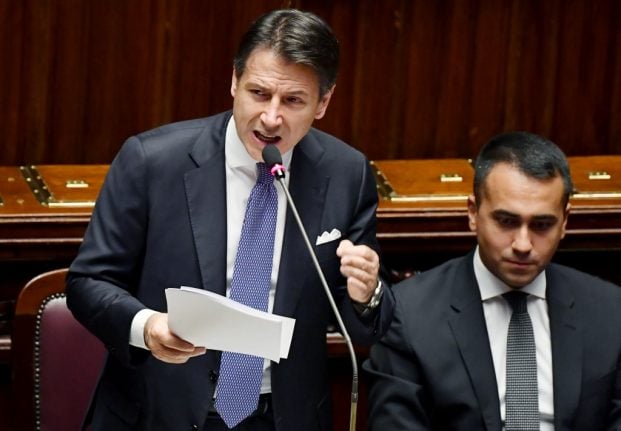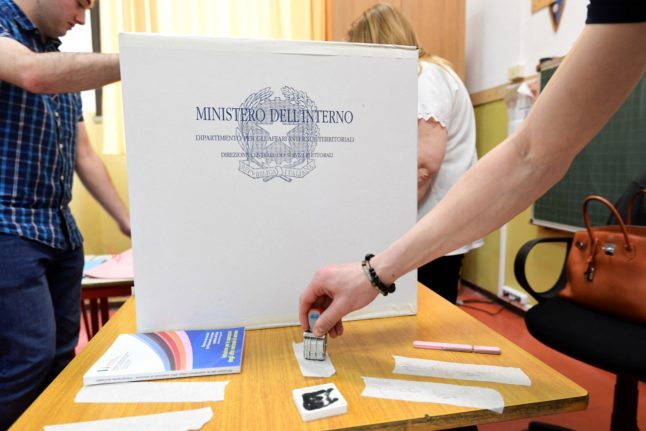Conte's speech to the Chamber of Deputies on Monday was the longest parliamentary address on record, clocking in at an hour and half.
READ ALSO: Italy's new government faces first confidence vote amid protests
That's partly because he was repeatedly interrupted by jeers from the right-wing opposition, who broke out in chants of “Elections! Elections!” and had to be shushed by the speaker of the house.
But Conte still had plenty of time to promise what he called “a season of reforms” in Italy. Here are the main details.
Italy's political climate
Much of the start of Conte's first speech to parliament was dedicated to ticking off the previous populist coalition for endless bickering. He promised Italians that, after a season of bitter fighting and hate propaganda, the new keyword would be respect.
TIMELINE: 15 months of drama in Italian politics
“We cannot in the coming months waste our time with disputes and clashes,” he said, adding that the government must act with “new humanism” rather than arrogance.
EU budget rules
The most pressing dossier for the incoming coalition of the anti-establishment Five Star Movement and centre-left Democratic Party is the upcoming 2020 budget, a key test for relations with Brussels.
Conte called for the EU's Stability and Growth Pact, which limits budget deficits to three percent of gross domestic product in European countries, to be “improved” and simplified.
READ ALSO: Four key economic challenges facing Italy's new government
The pact was the main problem between the European Commission and the previous populist government in heavily indebted Italy, which must submit a balanced budget to Brussels in the coming weeks.
Immigration
On the hot-button topic of migration, Conte disappointed human rights activists who had hoped he would announce a sharp about-turn on former interior minister Matteo Salvini's controversial immigration law, although he did say integration measures would be boosted.
READ ALSO: How will Italy's new government approach immigration?
He said promises of solidarity between EU member states were not enough, and insisted both Italy and the bloc must stop treating the migration phenomenon in crisis-mode, but implement concrete measures such as humanitarian corridors.
Italy's relationship with the EU
Conte called for a “real shared project” among European countries, and floated the idea of a summit on Europe's future to boost Italy's relevance and redefine its role “in a world undergoing a full transformation”.
“Italy will play a main role in a phase of EU reform and renovation that aims to make Europe stronger, more inclusive, closer to its citizens, more attentive to environmental sustainability and social cohesion,” he said, adding that retreating into isolationism would not serve Italy's national interest.
PROFILE: Luigi Di Maio, from political upstart to Italy's foreign minister

Photo: Andreas Solaro/AFP
Tax
Conte said his government's fiscal policy would be simple: make sure that everyone pays tax, so that some people can pay less.
He said the government would look to reduce the tax burden on employers so that savings could be passed on to employees, notably by setting a minimum wage.
Italian citizenship
The law allowing foreign nationals living outside Italy to claim Italian citizenship via ancestry is “worthy of review”, Conte said, hinting that his government could introduce extra conditions for applicants.
Yet other “discriminatory” criteria may be scrapped at the same time, he said.
READ ALSO: No, marrying an Italian won't save you from Brexit
Inequality
Conte said the government would up efforts to improve the lives of the poor and disadvantaged, from income support for the lowest earners to help for the disabled, earthquake victims and working mothers, as well as tackling gender equalities.
As a matter of urgency, he said the government would look at increasing the number of nursery school places available and making them free for low-income families. It also aims to introduce a law mandating pay equality between female and male employees, Conte said.
READ ALSO: Why are there so few women in Italy's most powerful jobs?
He also talked about the need to spur investment in the disadvantaged south of Italy, including via a public investment bank.
Opportunities for young Italians
The prime minister said more would be done for Italy's young — particularly from the impoverished south — in terms of training and apprenticeships, as well as investments in universities, the digital sector, and heritage sites and tourism.
“Italy must be a laboratory of innovation, opportunities and ideas, capable of offering young people solid and convincing reasons to stay,” he said.
Innovation
Conte said the newly appointed minister of innovation – Italy's first – would work on turning the country into a “smart nation”: a modernized, more efficient place to live and do business.
READ ALSO: Foreigners rank Italy 'worst in Europe' for internet and paying without cash
He promised that Italians would get “a single, unified digital identity” within a year, while pledging to improve Italy's broadband infrastructure.
Climate change
In a nod to climate change concerns, Conte said the government was preparing a “courageous and innovative” Green New Deal, which would promote urban regeneration, the use of renewable energy and the protection of biodiversity and the sea.
Parliamentary reform
To applause from the Five Star Movement, which has long called for an overhaul of Italy's electoral system, Conte said he would propose a change to Italy's constitution to cut the number of members of parliament.
Read the full text of Conte's speech (in Italian) here.



 Please whitelist us to continue reading.
Please whitelist us to continue reading.
Member comments